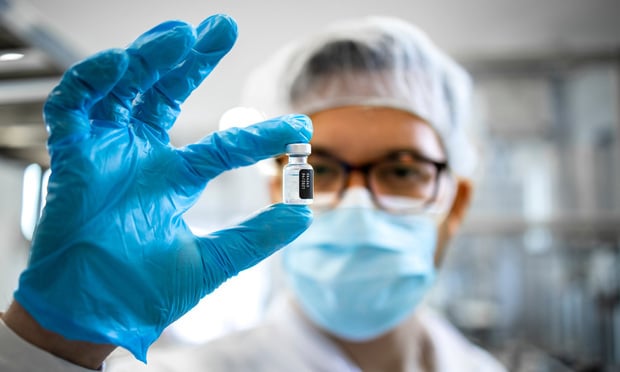 Photo: Littlewolf1989/Adobe Stock
Photo: Littlewolf1989/Adobe Stock
For years, the public viewed the pharmaceutical industry negatively, with public sentiment reaching its lowest levels in 2019. In Gallup's annual survey of opinions about different industries, the pharmaceutical industry ranked dead last that year, with 58% viewing it negatively and only 27% viewing it positively. In fact, these ratings were the lowest since Gallup began assessing opinions of different industries in 2001.
Some data suggest that public opinion of the pharmaceutical industry dramatically improved during the COVID-19 pandemic. While Gallup showed only a modest improvement of 7% gains in positive ratings in the 2020 industry rankings, other surveys showed substantial gains. For example, a 2021 Harris poll showed 62% had a positive opinion of the industry, which represented a 32% increase from 2020.
Recommended For You
In a March 2021 survey of likely voters conducted by the progressive think tank Data for Progress, the majority of respondents (56%) had favorable opinions of pharmaceutical companies. Ratings for Pfizer and Moderna, the first two companies to develop COVID vaccines, were even more notable with 65% and 60% favorability ratings, respectively.
As the pandemic ended, some evidence suggests that the surge in positive ratings has subsided. For example, Gallup surveys show positive opinions of the industry dropped from 34% in 2020 to 31% in 2021 and then 25% in 2022. Even the reputations of vaccine creators have not been immune to this drop. A 2022 Axios Harris poll showed Pfizer's reputation had already begun declining after its pandemic highs.
The survey
In February 2023, the DOAR Research Center sought to shed light on changing attitudes toward the pharmaceutical industry in two Northeastern federal court venues: the District of Delaware and the Trenton Division of the District of New Jersey. Delaware was selected because of the high concentration of pharma-industry IP cases litigated there and New Jersey was selected because it is home to many pharmaceutical giants, including Bristol-Myers Squibb, Johnson & Johnson, Merck, Novartis, Sanofi and Novo Nordisk.
Respondents included 608 jury eligible individuals, 303 from Delaware and 305 from New Jersey. The sample was representative of these two venues with regard to race/ethnicity, education and income. The survey questioned respondents on their opinions of the pharmaceutical industry and their COVID-19 experiences.
Survey findings: Opinions of the pharmaceutical industry
Results showed 72% of the respondents had a favorable view of the industry, clearly indicating that pandemic gains in positive feelings have not dissipated in these venues. Only 16% of respondents had a negative view of the industry.
However, respondents did not view all aspects of the industry positively. Ninety-two percent of the sample thought prescription drug prices were too high and 91% reported worrying somewhat or a great deal about not being able to afford needed prescriptions in the future. In fact, 60% said either they or a family member had struggled to pay for prescription drugs in the past several years.
Nevertheless, it appears that the public is becoming increasingly aware of the role of company costs in setting drug prices. When asked which of several factors was the main driver of prescription drug prices, the majority cited either research and development costs (29%), manufacturing costs (30%) or marketing costs (7%). Only 35% claimed that profits were the main driver of prescription drug prices.
Yet, respondents still believed that the industry is profit-centric. When presented with a statement suggesting brand and generic drug companies each was more concerned with profits than patients, the vast majority agreed (89% and 72%, respectively).
The role of COVID in public attitudes about the pharma industry
One of the most striking findings of this survey was the extent to which personal medical and financial experiences during the pandemic seemed to shape perceptions of the industry. Most respondents reported that they and/or those close to them were seriously affected by the pandemic. About two-thirds (68%) said they and/or someone close to them became seriously ill because of a COVID-19 infection, while 32% had no such experience. The former group viewed the pharma industry significantly more favorably than the latter.
These two groups also differed significantly in their views regarding the main driver of drug prices. Among those who cited serious illness, 75% attributed the high price of drugs to pharma company costs (R&D, manufacturing or marketing and advertising) while 25% cited company profits. In contrast, those who did not experience illness were far more likely to attribute high prices to company profits: 55% in this group did so, while 45% cited legitimate costs.
We saw a similar pattern with regard to experiencing serious financial hardship during COVID: 67% reported they or someone close to them experienced such hardship, while 33% did not. Again, those who experienced hardship expressed significantly more favorable views of the pharma industry than those who did not.
Further, among those with experience of hardship—similar to those who experienced serious illness—76% attributed high drug prices to pharma companies' costs while 24% attributed them to profit. In contrast, those who did not suffer financially were more likely to attribute high prices to profits (57%) than to costs (43%).
It appears that suffering during the pandemic gave respondents a different appreciation for the contributions that drug companies have made to society, and a different understanding of the costs that go into making valuable drugs.
Most favored generics over brands in broad opinions, but not litigation
The survey revealed notable differences between views of companies that invented and/or manufactured name brand drugs and those that manufactured generics. While views of both were largely favorable, generic companies elicited more positive feelings among respondents: 83% of respondents held a favorable view of generic companies while 71% held this view of brand companies.
Related: Biden's pharma fix: New 'march-in' rule allows HHS to seize patents of pricey drugs
It was striking, however, that in the context of litigation this pattern was reversed. Respondents were asked to imagine a dispute between a brand company that invented a drug that effectively treated a serious illness but was expensive, and a company trying to create a generic and less expensive alternative. They were asked which party they would be more likely to support, absent any other information about the case. While 26% demurred because they needed to "hear the facts first," 57% indicated that they would be more likely to support the inventor company, while only 17% would support the generic company.
Clearly, despite the broad preference for generics described earlier, when it comes to litigation, inventorship still carried hefty weight.
This difference was exacerbated by COVID experiences. Among those who had been seriously ill from COVID-19 or had someone close to them who had, 68% favored inventors while only 12% favored generic companies. In contrast, neither respondent had a clear advantage with those who had no serious illness experience: in this group, 33% favored the inventors and 27% favored the generic company. The data showed similar patterns regarding those who did and did not have experience with financial hardship during the pandemic.
Only time will tell, though, whether the boost to pharma's image engendered by COVID vaccines and other pandemic-era industry contributions will dissipate as we move further beyond the pandemic, or whether there has been a long-lasting shift in public attitudes.
Ellen Brickman, Ph.D., and Chad Lackey, Ph.D., are directors at DOAR.
© Touchpoint Markets, All Rights Reserved. Request academic re-use from www.copyright.com. All other uses, submit a request to [email protected]. For more inforrmation visit Asset & Logo Licensing.






